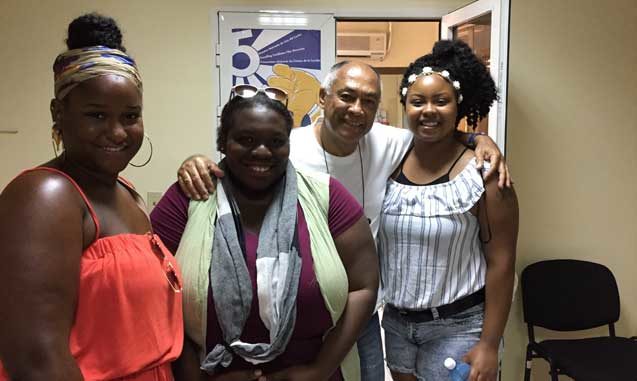
Deja Dennis
Havana, Cuba – The allure of the emerging New Orleans Film Industry has been recognized by filmmakers in the Caribbean, and New Orleans could even be the future site for the Travelling Caribbean Film Showcase.
Rigoberto López, a prominent Cuban Filmmaker and the President of the Caribbean Cinema Group, said that hosting the film showcase in New Orleans would promote the Caribbean Film Industry that reflects and connects the shared experiences of Black people within the Diaspora, living in the Americas.
“I think it is possible that we can show these films at a university in New Orleans,” López said in Spanish. The films that are selected for the showcase are prominent works of Caribbean Directors, and mostly depict the Black experience.
Born in Havana, Cuba, López produced a number of well-respected films. He wrote, directed and produced the award-winning film Roble de Olor (Scent of Oak) in 2004 that explored the intersection of race in the Caribbean in the 19th Century. His more recent work is Vuelos Prohibidos (Forbidden Flights) in 2015. He has filmed in various parts of the Caribbean, South America, and in Spain and has visited the U.S. for talks on Cuban cinema, society, and culture. He sees New Orleans as an ideal opportunity to grow Caribbean Film, particularly as the City is now considered the center of Hollywood South.
“The Black presence in the Caribbean is fundamental,” López said in Spanish. However, people in the region do not always get to see the films made by directors from the region. “People in those countries know of films from outside but not of their own native cinema, from their own countries, they have not seen them. So, this is a possibility to promote a better visibility for cinema in the region, in other countries in the world,” he said in Spanish.
The Travelling Caribbean Film Showcase is a not-for-profit, regional event for the purpose of promoting Caribbean Cinema, and knowledge about the culture. U.S. Actors Harry Belafonte and Danny Glover serve as honorary presidents for the showcase. The first showcase was held in Kingston, Jamaica in June 2005. From then on, each country chose a date to host the event. In Cuba, it is hosted in September. The films are judged and selected based on their artistic quality, logic, and themes, to show the rest of the world the craftsmanship of Caribbean Filmmakers and provide a look into Caribbean life.
“There are diverse titles that respond to the idea of the Black experience among us,” López said about the films that are selected. A lot of them discuss racial discrimination, social violence, and migration. López also noted the differences in the experiences of Afro-Cubans and African-Americans. He discussed topics like segregation and racial prejudice. Although López knows that there exists racism in Cuba, he believes that the effects of it have been worse in the U.S. The portrayal of African-Americans in Hollywood Films sometimes reinforces this view of Black people among many Cubans.
“In the movies, Black people are mostly the drug dealers and the killers,” said Lusmila Lamothe, 23, who studied communications at the University of Havana. This is the image Lamothe said many young Cubans see of African-Americans through U.S. Cinema.
Many Black filmmakers in the region, like Lopez, agree that race is a far more complex issue that can be explored beyond the Hollywood narrative. The main objective of Caribbean Cinema is to show a more diverse representation of Black people in the Americas to combat the negative stereotypes shown in American media. This agenda is becoming easier to achieve as the film showcase gains more recognition.
“There are diverse titles that respond to the Black experience among us,” López said about the contribution of Caribbean Cinema to exploring issues of race. “And we can explore the possibility of an exhibition in New Orleans,” he said.
Many Black filmmakers in the region, like Lopez, agree that race is a far more complex issue that can be explored beyond the Hollywood narrative. The main objective of Caribbean Cinema is to show a more diverse representation of Black people in the Americas to combat the negative stereotypes shown in American media. This agenda is becoming easier to achieve as the film showcase gains more recognition.
“There are diverse titles that respond to the Black experience among us,” López said about the contribution of Caribbean Cinema to exploring issues of race. “And we can explore the possibility of an exhibition in New Orleans,” he said.
Recommended For You.

Data News Staff Edited Report
Congratulations!!
NAACP ACT-SO NEW ORLEANS
The NAACP ACT-SO (Afro-Academic Cultural, Technological and Scientific Olympics) is


Be the first to comment